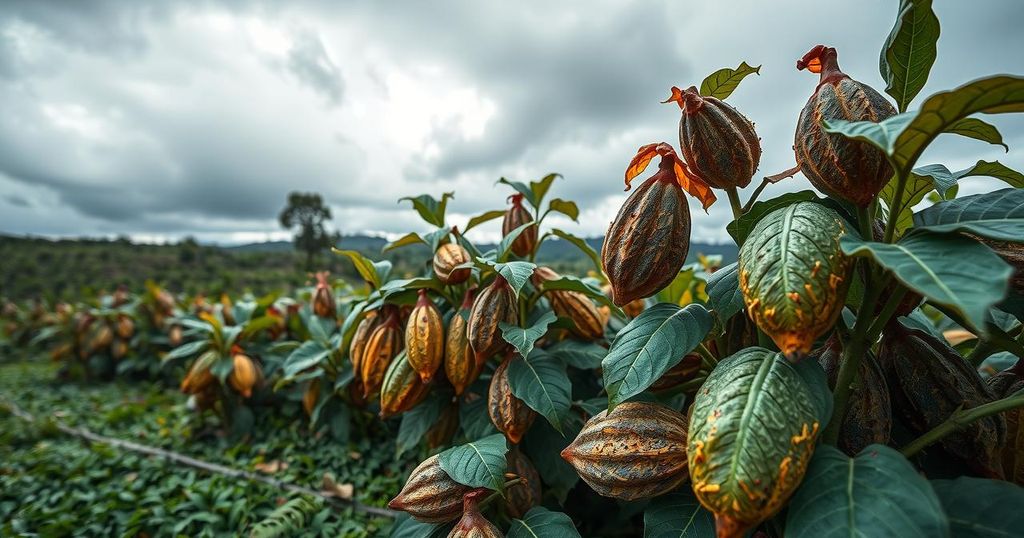The Impact of Climate Change on Chocolate Production and Cocoa Farming
Climate change is adversely affecting chocolate production by increasing cocoa costs and threatening the livelihoods of farmers. Research indicates that rising temperatures are making it harder to grow cacao trees, leading to lower yields and higher prices. Significant price increases in cocoa and associated challenges for farmers further emphasize the impact of climate-related changes on this beloved commodity.
Climate change is increasingly jeopardizing chocolate production, with studies indicating that rising temperatures are causing significant challenges for cocoa cultivation. A report from Climate Central illustrates that as climate change progresses, it is becoming more difficult to grow cacao trees, the essential plants that produce cocoa beans. Consequently, chocolate prices are expected to rise and availability may dwindle in the future. Moreover, data from the UK charity Christian Aid highlights the adverse effects on farmers engaged in cocoa production, many of whom are among the world’s poorest individuals.
The research conducted by Climate Central analyzed temperature trends across major cocoa-producing regions over a decade. Findings reveal that heat exceeding 32 degrees Celsius—considered detrimental for cacao plants—has increased significantly, lasting three additional weeks each year in regions like Ghana and Ivory Coast. Excessive temperatures can diminish both the quantity and quality of cocoa harvests, leading to escalating costs for consumers.
The chocolate industry’s dependence on stable climate conditions is clear, as cacao trees struggle to thrive in soaring temperatures, which have been exacerbated by human activities that contribute to global warming. The report indicates that the last decade has encountered unprecedented heat, with the year 2023 marking the hottest on record, leading to temperatures surpassing 32 degrees Celsius on numerous occasions. This severe climate change impacts the supply of cocoa beans, resulting in price surges of 136% from July 2022 to February 2024.
In addition to heat-related issues, cocoa farmers are facing challenges from increased rainfall and pest infestations, further exacerbating the cocoa supply crisis. Christian Aid underscores the critical importance of cocoa farming for many impoverished communities, with director Osai Ojigho stating, “Growing cocoa is a vital livelihood for many of the poorest people around the world and human caused climate change is putting that under serious threat.” As consumers, it is imperative to acknowledge these underlying pressures as they may directly influence chocolate availability and pricing in the future.
In conclusion, climate change poses a serious threat to chocolate production through rising temperatures and adverse climatic conditions that hinder cocoa cultivation. The escalating costs of cocoa and the detrimental impact on farmers highlight the broader socioeconomic issues at play. Urgent action against climate change is essential to protect both the chocolate industry and the livelihoods of those who depend on cocoa farming.
Original Source: www.bbc.co.uk




Post Comment